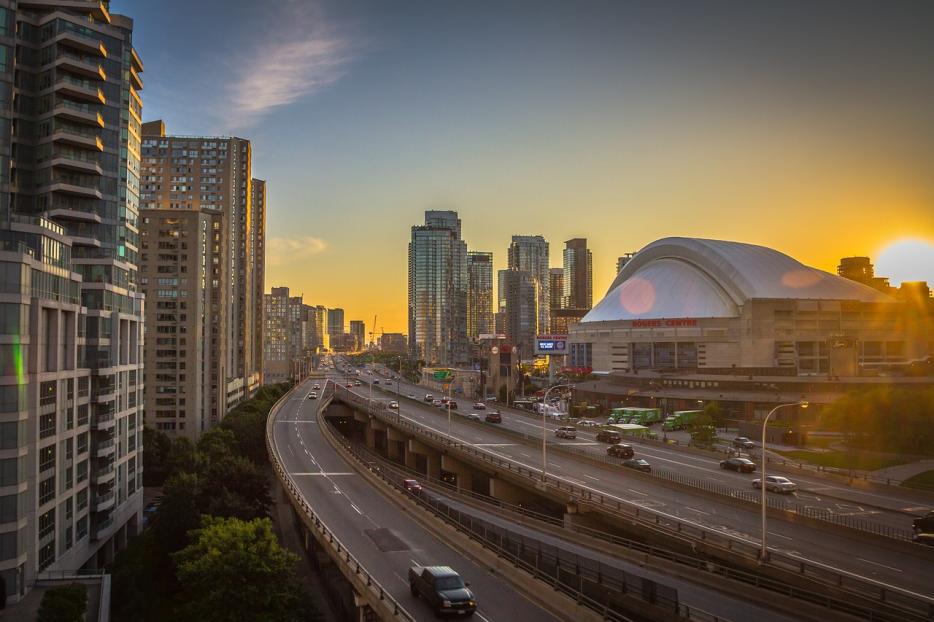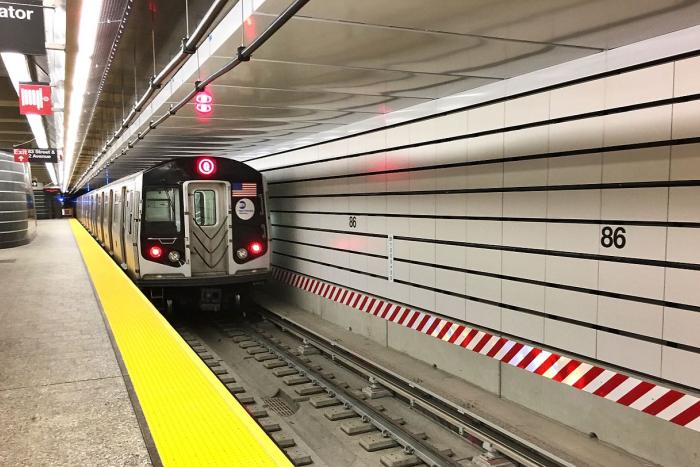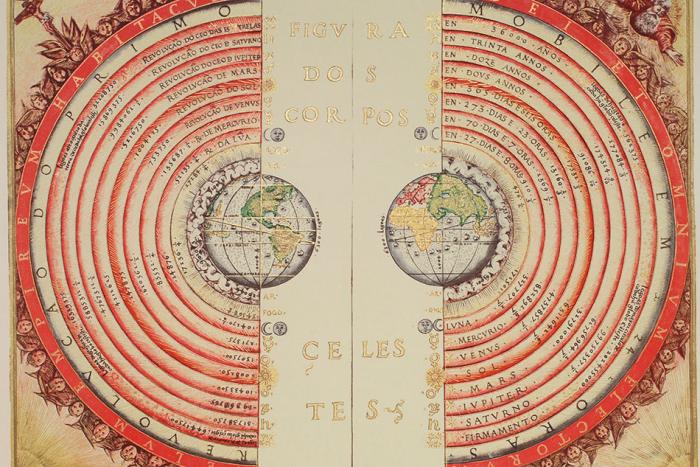In 2013, I went to see a Toronto Blue Jays baseball game with my older sister, Meghan. We walked to the stadium, past people selling knock-off double-entendre T-shirts reading I Heart BJs next to the hot-dog carts for maximum effect, and people buying both with great intensity. Lines snaked around the thick, concrete building; a sea of electric blue and white with bold numbers and names I didn’t recognize. After getting in, as we walked up the sloped ramp to our seats, I remarked to Meghan about the enormity of the SkyDome—the stadium built at the end of the ’80s. Suddenly, I heard someone shout at me for calling it the SkyDome. “It’s the Rogers Centre,” they emphasized self-importantly, brandishing the corporate name adopted in 2005. Then, someone else bellowed back that it will always be the SkyDome. That small quarrel echoed around the expansive path to our seats. To me, back then, the stadium was just an enormous circle that existed in downtown Toronto, home to expensive beer and food, so call it whatever you like, I don’t care. But serious baseball fans (or corporate supporters) are prickly about that sort of thing.
It was my first time watching the Jays face off against the New York Yankees. It was a late August day and the dome was wide open, so you could see the cotton candy pink clouds against sapphire blue. Jose Bautista was injured, I remember being disappointed about not being able to see him play. We sat in the lower section, close enough to shortstop Alex Rodriguez that I was convinced we made eye contact. I drank warm Alexander Keith’s beer, Meghan ate Twizzlers, delicately peeling them apart as we laughed and talked and I heckled. She tried to explain certain rules and plays to me, taking care and comfort in my curiosity about a game that had always existed around me but I was never really invested in.
But this wasn’t the first major league game I’d ever been to. That one, I’ve spent years trying to forget.
*
There were two rules in my house growing up: never set the microwave on fire (a rule my sister broke twice) and never talk shit about the Toronto Blue Jays. Growing up in the 1990s in Kitchener in southwestern Ontario, my experience with the Jays resembled a lot of other kids’. The team’s World Series wins in 1992 and 1993 were monumental; they placed Canada on what we viewed as the world map. My memory of the 1992 win, when I was almost four years old, is hazy. But how much it meant to my father is what I carry most. I remember watching Joe Carter’s home run the year after but, more than that, I remember how often my father did an impression of it in our backyard.
My father is the central figure here, revered in my house the way the Toronto Blue Jays were revered as gods. He is the reason baseball loomed over us. In our basement, he had a shrine to the Jays’ two World Series wins: their team photos placed on a wood mantle he had built; the pennants affixed to the wall next to it. It was the first thing you saw when you walked down there and the last thing on your way back up. He did this, I suppose, as a way to pay a religious sort of tribute to his team, to his sport, the way our Catholic relatives paid their respects to photos of Jesus on the way up and down their own stairs. Our religion was Joe Carter and Roberto Alomar.
I don’t have a relationship with my father now. Even when I was a kid, he was always out of reach, always at a distance. We haven’t spoken in almost eleven years. I very much doubt that we’ll ever speak again.
*
Once, in a heated conversation with my mom, my father told her he wished he had two sons instead of two daughters. My father, once charismatic and witty, the traits I’ve identified I received from him, was, and maybe still is, a deeply angry alcoholic and an addict; a man who used to do lines of cocaine off the dresser in my room or the top of the refrigerator and smash empty bottles of Molson Canadian at my mom’s feet during their weekly fights. After decades of emotional and psychological abuse, my mom kicked him out when I was twelve. The day after their twenty-year anniversary, he was escorted from our house by police. They officially separated.
He lingered in my life when I was a teenager, often to share his side of whatever story he wanted to tell, which mostly involved the reasons why my mom was wrong and he, a man who had gone through so much in his life, should not be portrayed as a villain. He was physically and sexually assaulted as a child, he told me, in great, descriptive detail. This was the reason, at least to him, he could “get away” with what he had done in his life, which, to put it succinctly, was a lot of bad shit. There are men up and down Highway 401 who have been subjected to his physical cruelty; his cavalier way of doling out drugs for profit to people he thought of as weak. My father believed he owed no one anything but was owed so much more by the world.
His legacy to me, though, is of never wanting my sister or me, of never loving us. He didn’t directly say “I don’t love you,” but his actions told us that in the absence of words. This was confusing for many years, particularly for me, because my father did attempt to be present in my life, taking me out on weekends for breakfast to a greasy diner near the gravel pit where he worked. The looks of fondness, of what I thought was pride, faded from his face as I got older, and eventually they were replaced with panic, a last-chance grasp to hold onto me as a way to hold onto my mother. An abuser like him will try every avenue to regain control. This warped sense of what loving looked like disintegrated our relationship. He tried to convince me of his own humanity, and I thought that, perhaps there, I would find peace. But he could never be the father I needed him to be.
“The past is in the past,” he would say to me, frantic almost, as though he were selling something. “You have to forgive or it’ll kill you."
My father was an exhausting person.
I have three photos of him. In the summer of 2014, my mom packed up every photo she had of my father into a worn-looking shoebox. It was her own personal purge of the man who had dictated the first half of her adult life. By then, it had been seven years since I’d seen him. I went through the photos, with a curiosity verging on masochism. I wasn’t drawn to the pictures of him holding a tinier version of me, his shaggy brown beard resting atop my blonde wisps. Rather, I pulled out the ones of him as a child: two of him, alone, as an infant in his baptism gown and his only grade school photo, where he smirks the same way I do now. I kept them, I think, to remember him not as the person who would yell at me in drunken rages but as someone who was once untouched by the world and hadn’t been treated badly by the people in it. It feels compassionate to remember him like that, whether or not he deserves it.
But the photograph I always recall is long since gone. When I think of him as an adult, as my father, I remember him when he got a baseball to the face when I was six years old. His eye became an incredible impression of an eggplant. The skin around his fused-shut eyelid was royal purple; piss yellow rimmed the edges, bleeding into the red that marked his cheekbones. Briefly incapacitated by the thing he loves most. He’s smiling at the camera because that’s the kind of person my father was: playfully smug in the midst of destruction.
The love and dedication he gave to baseball is what I remember most about him—both how joyous it was to him, and what it represented, intrinsically, to attach his life to a sport. He spent weekends playing baseball with his friends, drinking beers in between innings. He played in a regional league. He tried to conceive of a way that baseball could function as a gang and identity for him—a way to puff out his chest, show off his success, that he wasn’t ordinary. He had dreams of being in the major leagues. My childhood is marked by the lengthy discussions we’d have about how good and perfect he’d be for the majors, even though he was thirty years old when I was born. He had a deluded belief that, one day, he could be placed on someone else’s baseball shrine, too, and become something more than what he was.
*
He took us to my first major league game when I was ten years old, in 1999. Meghan was sincerely excited; my mom and I tagged along because this is what a family is supposed to do. These outings always failed before, like when we went to the Royal Ontario Museum and my parents screamed at each other in front of the mummies.
Toronto is an hour drive east from Kitchener and, even though it is a routine, boring journey to me now as an adult, it was special then: watching the stretch of grey concrete disappear below us as we went farther and farther from the sameness of my suburban neighbourhood toward the metropolitan horizon. There is an overwhelming pulse of electricity when you’re not a city kid but you get to be in the city. I grew up poor and the entire journey from doorstep to an iconic Toronto landmark was a privilege—an expectation of good, which was why disappointment could feel heavy.
Everything had to be done on my father’s schedule. It was a grey day and I wore my blue and purple windbreaker. We circled the Rogers Centre, when it was still called the SkyDome, and I ate a hot dog from a cart outside because we were, as out-of-towners usually are, painfully early. I chased some pigeons off the steps, looked up at the CN Tower with awe, promising myself to never go up there. I remember my mom going through the motions of her designated role that day: collecting us, making sure my father had the tickets, trying to smile. I didn’t know yet how painful their relationship was.
The Jays were playing the Seattle Mariners, and Meghan and I called out to a then young Alex Rodriguez on the field. She, a teenager, and I, a pre-teen idiot, found comfort in learning the language of desire and catapulting it onto the men who ran across the field, watching them stretch on the bright green grass. The stadium is an all-consuming space. I sat, not paying attention, staring at the sky and then down at the seats that marked the colossal rotunda. I felt small and then smaller still as I heard my father grumble that we were losing.
It all seemed like fairly ordinary fun to me: men walked onto the field, they walked off during a strike-out, music played between the innings, people swept the dirt between the bases. I leaned on the bars in front of me, watching my sister watch the game, then looked to my mother with her hand on her face, and, lastly, to my father, who shifted around in his seat, sighing and groaning. It didn’t occur to me then that we weren’t having a good time, that we weren’t doing our duties of performing a family unit well. I ate some popcorn and cooed at my sister every time she saw Shawn Green.
By the seventh inning, we were down 3-0. Suddenly, gruffly, my father pulled us up and out of our second deck seats, popcorn littered on the cement beneath us, and said there was no point in supporting losers. This day, he told us, was a waste of time. Watching my father yell at my mother and at us as we walked down the winding concrete slope toward the street level exit, I finally glimpsed the fracture of their relationship, of the family we tried to be but never were. He was disappointed in us more than the baseball team because we were right there, not in the dugout. We were targets he could thrust his anger on and I felt it; my face was hot, unsure then how he could be that angry. What had we done to him? All I could do was stare down at the grey cement while we walked away from the game. We weren’t one as a family unit. We never could be.
Ultimately, when I think about my dad and baseball, the sport and my childhood experiences of it are a painful illumination of all the ways he failed as a father and person. My father believed he was meant for something more. More than my mom, more than my sister and me, more than the drugs and beer he consumed near-nightly to cope with being a regular man, not an extraordinary one. He did fail that day. He failed at being a responsible, caring parent, a person, and instead showed how deeply selfish and broken he was. He failed at loving us; at trying to fix himself for us. That day, I decided to shut baseball out of my life. The Blue Jays sucked for some time after that. I grew up and away from not only that moment but many moments involving my father and sports. It was one of the first steps in my eventual decision to completely remove my father from my life, too. I distanced myself, something I’m quite good at, from the sport—sports in general—adopting a persona that, on purpose, used the Internet slang of “sprots” to indicate how removed I was from athletics. I joked at the expense of myself about not knowing the rules or what the game meant at all, which, more than anything, chipped away at my own perception and worth in conversation with almost anyone. It was how I coped.
*
Meghan, who hasn’t spoken to my father in almost twenty years, has a different relationship with the sport. She leaned into it. She kept up with the waning Blue Jays, dedicated almost, and always felt a sense of optimism on the horizon for them, and perhaps for us. Meghan’s relationship to my father is different from mine, too. When Meghan was eighteen months old, my father tried to kill my mother. He threw his baby daughter onto the bed and tried to strangle his wife. Later that night, he pointed a gun at our mother as she tried to escape him with my sister. For years, Meghan had fragmented dreams about the incident, not knowing what it meant. And now, my father simply does not exist to her because he can’t. To her, forgiveness is not an option. She’s able to compartmentalize her memories with remarkable precision; constantly moving forward.
For me, any reminder of my father or what he liked stings me like a wasp. My father used me. He attempted to build a false relationship with me so he could get back together with my mom, whom he obsessively tried to control. The realization that he didn’t sincerely care about me or my life broke me. I engage with these memories as though they happened yesterday. Moving through spaces with this hyper-awareness is disastrous at times. It is uncomfortable to feel small, to make myself feel small, at the mere thought of my father, when he hasn’t earned the right to be part of my life at all—memory or real, fleshly form. I will, I believe, live so much of my life without him that those years at the beginning will eventually blur, won’t matter as much.
Sometime in 2013, Meghan and I decided, finally, after years of stepping around the topic, to go to a baseball game on our own. When we were in the stadium, I could sense my father’s presence at first. But he’s never met me as a grown-up. My father’s figurative ghost drifted away before the seventh inning stretch, floating off toward the condos and the highway. What my sister and I found together in the Rogers Centre that day was joy, not pain; a new experience that wasn’t his and became entirely our own. The Blue Jays lost but, this time, that didn’t matter. There was no expectation of perfection; there were no expectations period. They didn’t have to look or perform a certain way; they just had to try. Which, perhaps, is what my father couldn’t do. Expectations will ruin you.
Meghan and I walked out of the Dome elated, eager to do it again. Since then, we’ve stood countless times, in the 100s section, in front of the rows of plastic blue seats, leaning against the barricade to watch the game or talking about the particular good or bad parts of our lives. We stood side-by-side screaming as we watched Josh Donaldson hit one of the final home runs during a 2015 playoff game against Kansas City. We send each other baseball-specific memes on Instagram or updates about players. Somehow, the Rogers Centre became a safe space to decompress emotionally for the both of us. This season, we watched the team evaporate from what it used to be, looking at a future dedicated to rebuilding.
I still have the ticket from that Blue Jays/Yankees game in my wallet; I transfer it over with the same urgency as my credit cards when I get a new one. I’ve told people this is the first major league game I went to, not the one in 1999 with my father. Because then, we went on his terms, for his ego. And now, this sport is no longer his sport, his interest. My sister and I made it ours.






